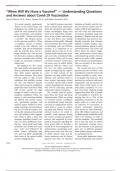PERSPECTIVE
2202“when will we have a vaccine?”
n engl j med 383;23 nejm.org December 3, 2020“When Will We Have a Vaccine?”
“When Will We Have a Vaccine?” — Understanding Questions and Answers about Covid-19 Vaccination
Barry R. Bloom, Ph.D., Glen J. Nowak, Ph.D., and Walter Orenstein, M.D. In recent months, epidemiolo -
gists in the United States and throughout the world have been asked the same question by clini -
cians, journalists, and members of the public, “When will we have a vaccine?” The obvious answer to this question would be, “When a candidate vaccine is demon -
strated to be safe, effective, and available. That can be determined only by scientific data, not by a target calendar date.” But we real -
ize that such a response, although accurate, overlooks much of what people are ultimately seeking to understand.
The emphasis on “we” reveals that most people want much more than an estimated vaccine-delivery date. Their inquiry typically in -
volves three concerns. First, when will the public be able to have confidence that available vaccines are safe and effective? Second, when will a vaccine be available to people like them? And third, when will vaccine uptake be high enough to enable a return to pre -
pandemic conditions? Often, the inquiry is also assessing whether the biotech and vaccine compa -
nies, government agencies, and medical experts involved in devel -
oping, licensing, and recommend -
ing use of Covid-19 vaccines real -
ize that the responses they provide now will influence what happens later. There is often a sense that messages regarding Covid-19 vac -
cines can have problematic fram -
ing (e.g., “warp speed”) and make assertions that involve key terms (e.g., “safe” and “effective”) for which experts’ definitions may vary and may differ considerably from those of the general public and key subpopulations.As Covid-19 vaccines move into phase 3 clinical trials, enthusiasm about the innovative and sophis -
ticated technologies being used needs to be replaced by consider -
ation of the actions and messag -
es that will foster trust among clinicians and the public. Although vast investments have been made in developing safe and effective vaccines, it is important to re -
member that it is the act of vac -
cination itself that prevents harm and saves lives. Considered fully, the question “When will we have a Covid-19 vaccine?” makes clear the many ways in which efforts related to both the “when” and the “we” can affect vaccination uptake. Recognizing the signifi -
cance of both aspects of the question can help public health officials and scientists both to hone current messaging related to Covid-19 vaccines and to build a better foundation for clinicians who will be educating patients and parents about vaccination.
The recently released guide -
lines from the Food and Drug Administration (FDA) on testing of Covid-19 vaccine candidates are scientifically sound and indi -
cate that no compromises will be made when it comes to evaluat -
ing safety and efficacy.1 This com -
mitment needs to be stated re -
peatedly, made apparent during the vaccine testing and approval process, and supported by trans -
parency. Assurances regarding the warp speed effort to develop a vaccine or to issue emergency use authorizations accelerating avail -
ability must make clear the ways in which clinical trials and the review processes used by federal agencies (the FDA, the National Institutes of Health, and the Cen -
ters for Disease Control and Pre -
vention [CDC]) will objectively as -
sess the safety and effectiveness of vaccines developed using new platforms. Clinicians and the pub -
lic should have easy access to user-
friendly materials that reference publicly available studies, data, and presentations related to safety and effectiveness. The FDA’s and CDC’s plans for robust longer-
term, postlicensure vaccine safety and monitoring systems will also need to be made visible, particu -
larly to health care professionals, who are essential to the success of these efforts.2
The second key part of this question pertains to when a safe and effective Covid-19 vaccine will become available to some, most, or all people who want one. This question has technical and moral components, and the answers on both fronts could foster or im -
pede public acceptance of a vac -
cine. Data from antibody testing suggest that about 90% of people are susceptible to Covid-19. Ac -
cepting that 60 to 70% of the population would have to be im -
mune, either as a result of natu -
ral infection or vaccination, to achieve community protection (also known as herd immunity), about 200 million Americans and 5.6 billion people worldwide would need to be immune in order to end the pandemic. The possibility that it may take years to achieve the vaccination coverage neces -
sary for everyone to be protected gives rise to difficult questions about priority groups and domes -
tic and global access.
Given public skepticism of gov -
ernment institutions and concerns The New England Journal of Medicine Downloaded from nejm.org on September 7, 2021. For personal use only. No other uses without permission. Copyright © 2020 Massachusetts Medical Society. All rights reserved.




